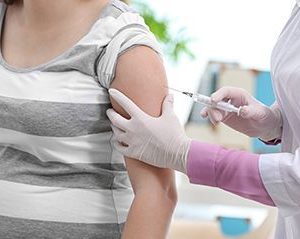- Are You Making This Expensive Thermostat Error This Winter?
- Recognizing the Signs of Hypothyroidism
- 10 Strategies to Overcome Insomnia
- Could Artificial Sweeteners Be Aging the Brain Faster?
- Techniques for Soothing Your Nervous System
- Does the Water in Your House Smell Funny? Here’s Why
- Can a Daily Dose of Apple Cider Vinegar Actually Aid Weight Loss?
- 6 Health Beverages That Can Actually Spike Your Blood Sugar
- Treatment Options for Social Anxiety Disorder
- Understanding the Connection Between Anxiety and Depression
Allergists’ Group Offers Guidelines on COVID-19 Vaccines

A task force of allergists and immunologists recommends those administering the COVID-19 vaccine ask patients some key questions beforehand.
While reactions to vaccines are extremely rare, the American College of Allergy, Asthma and Immunology (ACAAI) said anyone being vaccinated should be asked if they have a history of a severe allergic reaction to an injectable medication.
If the answer is yes, the individual should be referred to a board-certified allergist for evaluation before getting the COVID-19 vaccination, ACAAI said in a news release.
The academy also said COVID-19 vaccines should be given in a health care facility where an allergic reaction can be treated. Patients must be monitored for at least 15 to 30 minutes after injection for any adverse reaction.
COVID-19 vaccines should not be given to people with a known history of severe allergic reaction to any component of the vaccine.
According to the U.S. Centers for Disease Control and Prevention, if you have a severe allergic reaction after the first shot, you should not get the second shot.
Data regarding risk in individuals with a history of allergic reactions is very limited and evolving, according to ACAAI. Patients and doctors should balance the risks and benefits of vaccination.
People with allergies to medications, foods, inhalants, insects and latex are probably no more likely than others to have an allergic reaction to COVID-19 vaccines.
COVID-19 vaccines can be given to immunocompromised patients, according to ACAAI. But such patients should be warned of the possibility that they will have a lower immune response.
If you are vaccinated, you should expect pain, swelling and skin rash at the injection site; some swelling of the lymph nodes on the same side as the vaccinated arm; and systemic symptoms such as possible fever, fatigue, headache, chills, muscle pain, joint pain or inflammation. These usually resolve in a few days.
More information
For information about COVID-19 vaccines, visit the U.S. Centers for Disease Control and Prevention.
SOURCE: American College of Allergy, Asthma and Immunology, news release, Jan. 7, 2021
Source: HealthDay
Copyright © 2026 HealthDay. All rights reserved.










